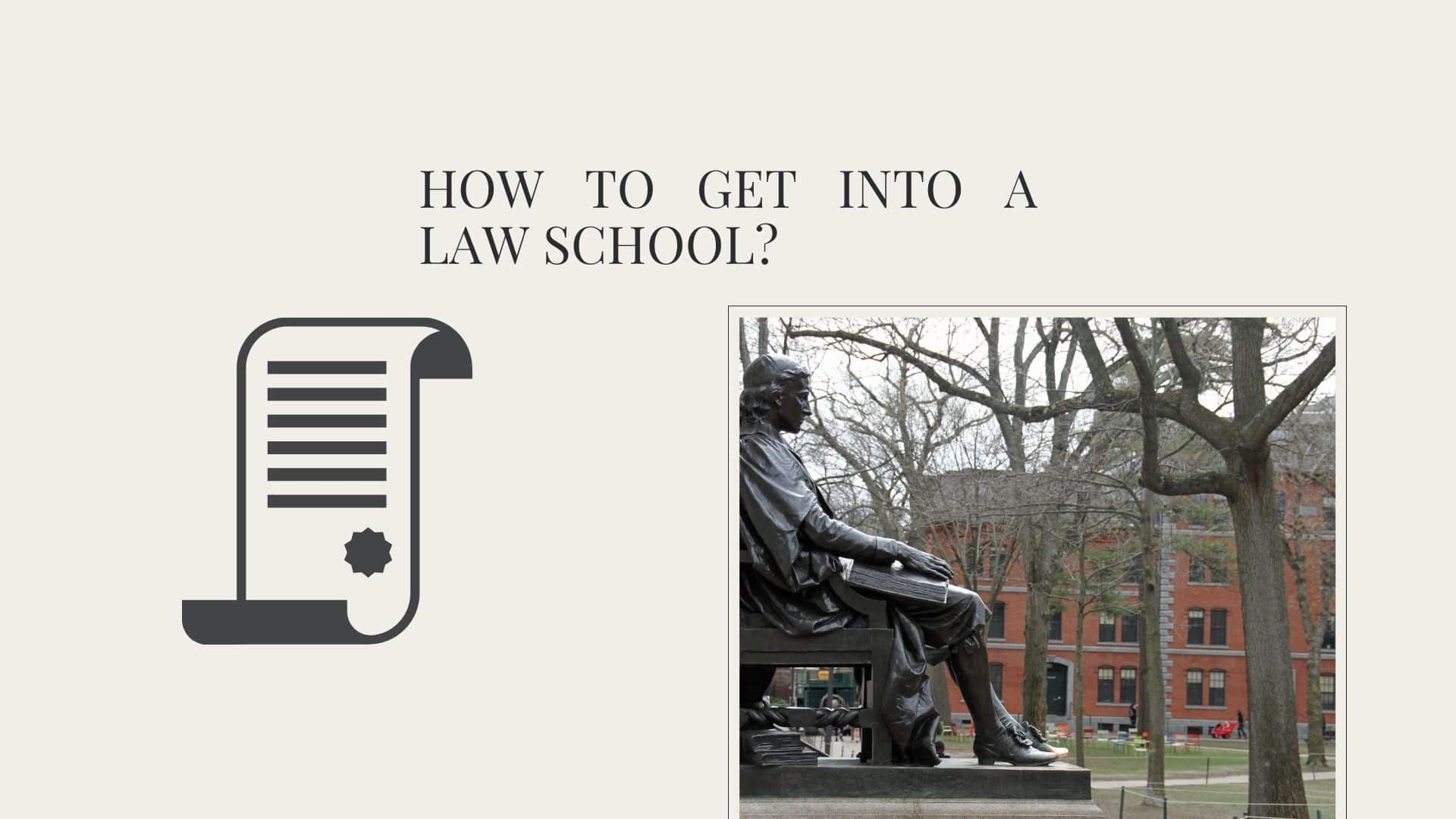In 2012, Yale rejected 57 of the 113 applicants who had LSATs of 175+ and GPAs above 3.75. In the same year, Yale accepted 34 applicants with LSAT scores under 165. You would find the same disparity at Harvard, Stanford, etc. It’s 2023, but statistics have slightly changed, and in some cases, even worse. So, how do I get into law school?
Why do the 34 “low-scorers” get in while the 57 LSAT “acers” do not? Similarly, what’s the difference between the 47 admits and the 340 rejects in the 165-169 / 3.75+ range?
Everyone who writes and talks about law school admissions tells you one thing about the process: “It’s all LSAT and GPA.”
That phrase echoes in phone calls between prospects and their lawyer friends, from the test prep experts, from pre-law advisors, throughout message boards, and even from some former admissions officers. But the statistics cited above, which are reported religiously by law schools each year to the LSAC, do not lie.
GPA and LSAT scores don’t tell the whole story. It’s not that they’re not tremendously important (Yale accepts about 2% of applicants with LSATs under 165 and 40% of those 175 and above); they’re just not the end-all-be-all of law school admissions.
Yes, you can get a 160 and get into Harvard; you just have to have a lot more going for you.
How Can I Prepare Myself to Get Into a TOP Law School?
Law school admission committees are looking for people with strong academic promise, equally strong professional promise, and compelling personal attributes.
Strong Academic Promise
Although the LSAT and GPA aren’t the only factors of importance, they demonstrably carry a lot of weight with people like Joyce Curll and Ann Killian Perry (law school admissions directors at Harvard and U. of Chicago, respectively).
When these people sit down to look at an application, they are not saying to their team, “Oh, forget the scores and grades let’s just admit the poet.” For schools like Yale, Harvard, and Stanford, the bulk of admits are in the 170 range. They also are at least in the 3.7 GPA range.
At Wash U. or Wisconsin, there are a ton more admits with 3.4 GPAs and 164 LSATs. These are also excellent law schools, but admissions-wise, they are a different world.
What are they looking for when they examine your grades?
Of primary interest to the admissions committee is your transcript.
- Did you take tough classes?
- Did you do well in those classes?
- Was your major “meaningful” (they don’t like “criminal justice” and some of the other so called “pre-law” majors that much)?
- Did your grades trend upward, or did you have a slump?
- And what was your GPA in your major?
Most of you are probably reading this with your undergraduate GPA pretty much locked up. So half of that “academic promise” thing is out of reach, right? Not quite.
First, a couple of factors are already set in stone: your transcript as it stands now and your major. But you can still take more classes; you can take more rigorous classes, and you can ace the classes you are already taking. Your first-semester senior year classes and grades will count.
If you end up waitlisted anywhere, your second-semester senior-year grades and classes will count. You can also take post-graduate courses and try to boost your academic record (though these don’t count quite as much). For those of you interested in grad schools, graduate admissions consulting services could be a great option to opt for.
What about the LSAT score?
Your LSAT score is probably at least as important as your transcript because it can give a much more objective idea of your actual academic performance and your capability of handling law school work.

Admissions committees look at all your scores if you take the test more than once, which should probably cause you to at least hesitate before taking it that second time (or third time).
More so than for the SAT, there is a law of diminishing returns in retaking the LSAT. But you can get better at it. If you’ve taken a practice test or two and are unhappy with your performance, you can improve.
Take a prep course, study LSAT prep books, get a tutor, get assistance from one of the best college admission consultants (or do all of the above!). There is no excuse for not getting the best score possible on this important exam.
Academic participant
There is one other factor going into academic promise-they want to know what kind of an academic participant you will be in the law school community.
The admissions committees look primarily to your letters of recommendation to get the answer to that question. They do read those letters! It is crucial that you get them from faculty members who know you well and will write well of you.
Without a doubt, some of those Yale rejects with 175+ LSAT ended up in that position because their letters of recommendation were mediocre. What does this mean for you?
- If you don’t have a good relationship with a professor, can you develop one?
- Is there someone else in the academic world who can write a good letter for you?
- An honors advisor or a similar mentor?
Remember, committees are judging your academic promise, not your basketball ability, so a coach may not be the best idea. Also, you have to prepare your recommender.
Don’t just hand over a resume, but instead, sit down with him or her and talk about what role they are filling for you in this process. Talk about anecdotes and experiences that you have shared. You have only one chance to get this right, or you’ll be applying again next year.
And don’t try to get a celebrity to write this letter of recommendation unless the celebrity is your mom. Admissions directors love to pin up the celebrity letters, but the applicants just get a chuckle, not an admit letter.
Professional Promise
Schools of law do not want to churn out parasites, misanthropes, and unethical scamps. For those of you who think those terms define lawyers, work on suppressing those feelings when you are applying to schools.
The top schools want students who will not only be good lawyers but will be good leaders. People who will have an impact on the legal world (or business or government) and on their communities.
How do they judge professional promise?
The admissions committees look for candidates who have exhibited leadership on their undergraduate campus, in their jobs, or in their communities. They also are looking for applicants with some degree of career focus, though not to the extent that applicants for MBAs are expected to have. For this type, I would suggest going to top MBA admissions consultants for assistance.
Law school is a long and rigorous ordeal. The committees will be wondering if you are prepared for it and pursuing it with definite goals in mind. This doesn’t necessarily mean that you should focus your personal statement on why you want to go to law school, though that can be a compelling story. The question should probably be answered, however, by reading between the lines of your application.
Why Law School?
For applicants to further advance in their careers, the answer to “why law school” is much more important and must be explained.
You might use the personal statement to bolster your claims of leadership ability, maybe talking about the step you took to take charge of the state federation of College Republican clubs, helping to elect a candidate to the U.S. Senate; creating a Habitat for Humanity chapter on campus; or starting a tutoring service organization to help out underprivileged children in the neighborhood of your school. You get the idea.
Exhibiting leadership in law-related organizations or legal services can give you a bit of an edge, but it has to be real leadership. And don’t worry, as per our experience working with various law school admissions consulting services, not every law school applicant has already saved the world!
Compelling Personal Attributes
Diversity gets a lot of press these days, especially as it relates to affirmative action in law school (and college) admissions. Clearly, race is one of the factors that admissions committees weigh as they look at applicants. And it should come as no surprise to anyone that being the “right” race can provide a bump in the admissions process. But it is only one of the many factors with which schools build “diverse communities.”

The committees are interested in having a geographically diverse class. They want students from many undergraduate schools. Admissions directors don’t want to have a full cohort of political science students without balancing them out with engineers and, biologists, with philosophers, and historians.
And though it may not yet reach the importance of race, socio-economically disadvantaged candidates are gaining more of an edge in the game of admissions. It means more to admissions officers to see a candidate who has lifted herself up out of poverty, paid her own way through college, and is now seeking to be the first lawyer in her extended family.
At the same time, some schools put a premium on legacies, while others demand a lot more than mere attendance by a family member.
“Compelling personal attributes” means more than just diversity. It is a criteria requiring students to “add” to a class. Is this candidate the type of person who stands out in his community, for his passion and empathy? Your letters of recommendation could also speak to this factor, though their primary purpose is to tout your academic accomplishments.
If you have been not just a leader but a valued friend, mentor, and tutor to your classmates and colleagues, a professor or, employer or sponsor should talk about that capacity you have for goodness and teamwork.
Law school has the stigma of competitiveness to live down, and admissions officers don’t want to perpetuate that stereotype. They want to build a class of compassionate performers. Smart, but not sneaky. Devoted to excellence, but not to cut-throat competition.
Communication Ability of a Candidate
Another personal attribute highly sought by committees is communication ability. Being a lawyer demands superior writing skills.
Most lawyers must also develop the ability to speak, influence, and negotiate with an adroit command of the English language. You will sharpen your legal writing skills in classes and internships, but the committees want to make sure you have a basic capability in the written language.
Your personal statement will help admissions officers judge that ability, as will your LSAT writing sample (if it is used, which is unlikely), and any extra essays that you send in. Your oral communication ability will not be directly judged, as most schools do not interview, but you can make a case for it with your letters of recommendation or discussion of extracurriculars.
If you led the Mock Trial Team to nationals or served as student government president, they will believe that you are a good speaker.
Ready to Get Into a Law School?
Above all, keep in mind that your law school future is not set in stone and that you can still affect your admissions chances, no matter how late you start.
You can improve the LSAT, prep your recommenders, etc. You can also make your personal statement say something about who you really are, and let it put you over the top.
Start with a little college tour to find the one that suits you better. Don’t let someone else take your spot in the 1L class of your first-choice law school!

